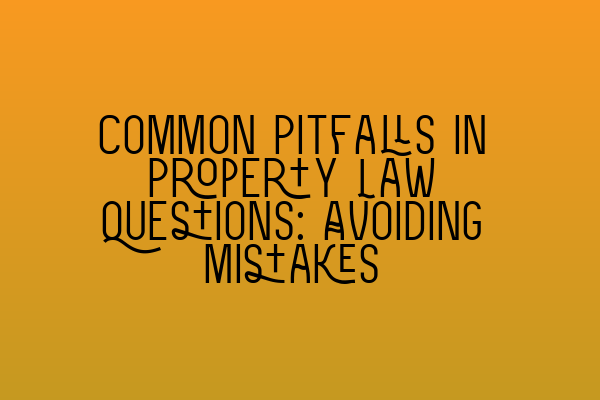Common Pitfalls in Property Law Questions: Avoiding Mistakes
When it comes to property law, answering questions correctly can make all the difference. Whether you’re studying for the SQE exams or working as a practicing solicitor, avoiding common pitfalls is crucial. In this blog post, we will explore some of the most common mistakes that people make in property law questions and offer tips on how to avoid them.
1. Failing to read the question carefully
One of the biggest mistakes that people make when answering property law questions is not reading the question carefully. Oftentimes, questions will contain important details or specific scenarios that need to be taken into account. By rushing through the question or skipping over important information, you may end up providing an incorrect answer. Take the time to thoroughly read and understand the question before attempting to answer it.
2. Neglecting to analyze the legal principles
Another common pitfall is failing to analyze the legal principles relevant to the question. Property law is a complex field with many nuanced concepts, and it’s important to demonstrate a strong understanding of the relevant legal principles when answering questions. Take the time to identify and analyze the legal principles that are applicable to the given scenario, and provide a well-reasoned answer based on those principles.
3. Overcomplicating the answer
While it’s important to provide a thorough and comprehensive answer, overcomplicating the response can lead to mistakes. Property law questions often have straightforward answers, and unnecessarily complicating the response can result in confusion. Stick to the relevant legal principles and provide concise, clear answers that directly address the question at hand.
4. Not citing relevant case law
Property law is built on a foundation of case law, and neglecting to cite relevant cases can be a costly mistake. When answering property law questions, be sure to refer to relevant cases to support your arguments. Citing cases not only demonstrates a deeper understanding of the subject matter, but it also adds credibility to your answer. Take the time to research and familiarize yourself with key property law cases.
5. Lack of practice
Practice makes perfect, and this holds true for property law questions as well. A common mistake is not dedicating enough time to practice answering property law questions. By regularly practicing, you can familiarize yourself with the types of questions that may be asked, develop strategies for approaching different scenarios, and build your confidence in answering property law questions correctly. Consider using practice exams and mocks to enhance your preparation (check out the related articles for SQE 1 Practice Exam Questions and SQE 1 Practice Mocks FLK1 FLK2).
6. Not staying up-to-date with changes in the law
Property law is a dynamic field, and it’s crucial to stay up-to-date with any changes in the law. Failing to do so can lead to outdated or incorrect answers. Make it a habit to stay informed about recent developments, case law, legislation, and regulations that may impact property law. Stay current to ensure that your answers reflect the most accurate and current legal information.
7. Inadequate time management
Time management is key when answering property law questions. Many people struggle because they spend too much time on one question and run out of time to answer others. Develop effective time management strategies to ensure that you have enough time to address each question. Practice under timed conditions to improve your speed and efficiency in answering property law questions.
In conclusion, navigating property law questions requires knowledge, careful analysis, and practice. By avoiding the common pitfalls outlined in this blog post, you can enhance your performance and increase your chances of success in property law. Stay focused, practice regularly, and stay up-to-date with the latest legal developments to excel in property law.
For more resources and preparation courses for the SQE exams, check out the related articles for SQE 1 Preparation Courses, SQE 2 Preparation Courses, and SRA SQE Exam Dates. Invest in your professional development and be well-prepared for your property law journey.
